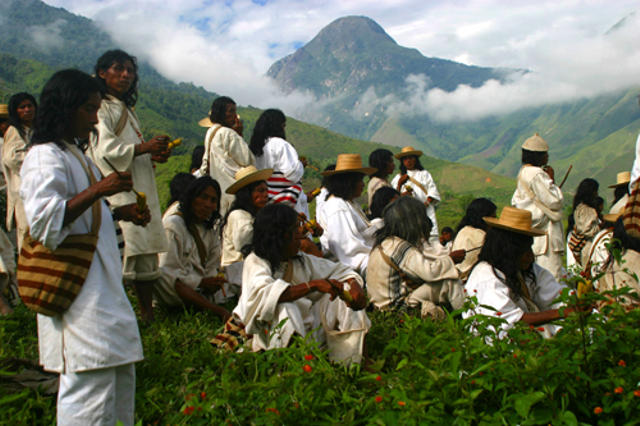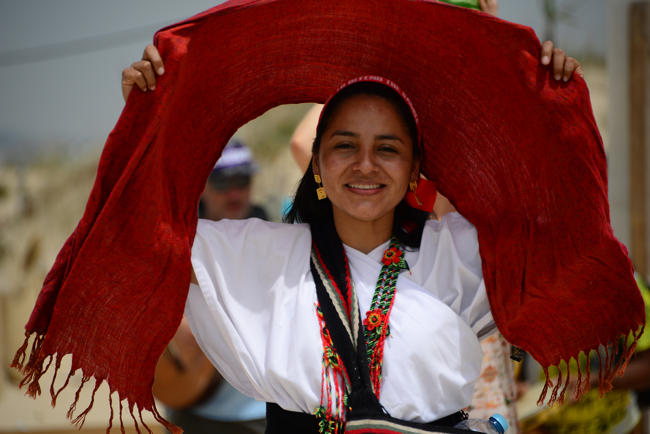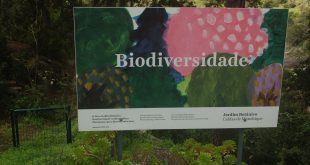Wednesday, May 6th, 2020
by Leila Dregger
I am now suffering doubly from the crisis: I am in bed with neuritis; I have a fever and I can hardly do anything. But I’m still keeping in touch with people I haven’t seen for a long time. One of them told me something surprising: last year, he went to visit the Kogi people in the north of Colombia. These people live in the mountains and are still quite isolated, continuing to follow their traditions and speaking of being “our big brothers”. The reason for this is that they think they have an understanding about life in harmony with nature that they must teach us, their “little brothers”, so that humanity can survive. When my friend was visiting them, the Kogi made the following interesting statement: there will be a global crisis, triggered by an “intelligent virus”. After that, humanity will have four years to emerge from the collective trauma in which it finds itself. If it succeeds, the era of solidarity will begin.
For me, the prophecies of indigenous peoples have always been inspiring. Even if we don’t believe in them literally, they represent an outsider’s viewpoint, which makes us realise that our life is relative. This prophecy is a strong one. The crisis has really happened. And now we have four years to overcome our collective trauma. How are we going to achieve this? What is this trauma? The virus has clearly exposed this collective trauma.

Social distancing is like a theatre of the absurd production of the disconnection that we were already experiencing. The trauma is this disconnection: we live far removed from each other and from what nourishes us. Long before this coronavirus outbreak, our existence was already organised in such a way that we were almost unaware of, or were incapable of sensing, whether the other people or animals we “live with” were well or not. We have entrusted the responsibility for their care to large companies and the State. The disconnection has given way to profitmaking, with priority being given to competition, greed, distrust, control and violence. For example, if we could feel in our own bodies the pain that our consumption causes in animals, we would not be able to continue like this.
I think the Kogi are right: in order to create a sustainable way of life, we have to start by going deeper and overcome the collective trauma. Putting an end to disconnection means understanding and feeling that we are one – and acting accordingly. From the bed where I am resting because of my illness, I watch the way the bushes and leaves move with the wind – the same wind that also comes through the window and refreshes me. We are all organs of a larger organism. An organism that acts as a whole. The liver doesn’t try to compete with the kidneys. The heart doesn’t steal oxygen from the lungs. It would be the end of everything and everyone. An organism is only well and healthy when the whole is well. It’s just that people are imbeciles (or completely disconnected), to the point where they can no longer feel the necessary sense of unity and try to destroy it.

This is what would be an effective plan for the four-year period I mentioned: to gradually change our forms of life and production, the structures we have for building new houses and managing their supply, so that we can feel the connection again. It all begins – even though these words may seem utopian – by opening our hearts to all the beings around us, to people, to animals, to everyone. Therefore, love your neighbour. Understanding how they are, helping them when needed, asking them for help when you need it. That’s what I’m doing now, and it results in mutual support. Here is an important key to a sustainable culture. Allied to cooperation with animals, plants, water and other organs of this great organism that is the Earth. And complemented by the joint administration of regional supply structures, within a fair and just regional exchange economy. That is how we enter the era of solidarity.
 Eco123 Revista da Economia e Ecologia
Eco123 Revista da Economia e Ecologia

